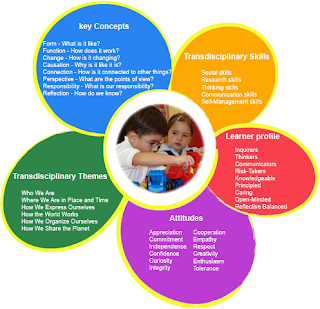Knowledge
The International Baccalaureate Primary Years Program is a framework for international education. There are five essential elements at the heart of the PYP. They are:
- Knowledge
- Skills
- Concepts
- Attitudes
- Action

Source
Knowledge is an essential element that addresses the question What do we want students to know about? The IB Organization believes that educating students in a set of isolated subject areas, while necessary, is not sufficient. Of equal importance is the need to acquire skills in context, and to explore content that is relevant to students, and transcends the boundaries of the traditional subjects (Making the PYP Happen, 2009).
Like all schools in Council Bluffs, we teach the district adopted curriculum which aligns with the Iowa Common Core Curriculum. Like all IB world schools, we help students make connections within and across disciplines in order to help them develop a deep understanding of important concepts.
IB provides a six transdisciplinary themes that are considered essential in a program of international education. According to the IB organization, these themes:
- Have global significance- for all students in all cultures
- Offer students the opportunity to explore the commonalities of human experience
- Are supported by knowledge, concepts and skills from the traditional subject areas but utilize them in ways that transcend the confines of these subjects, thereby contributing to a transdisciplinary model of teaching and learning
- Will be revisited throughout the students’ years of schooling, so that the end result is immersion in broad-ranging, in-depth, articulated curriculum content
- Contribute to the common ground that unifies the curriculums in all PYP schools
- Who we are- An inquiry into the nature of the self; beliefs and values; personal, physical, mental, social and spiritual health; human relationships including families, friends, communities, and cultures; rights and responsibilities; what it means to be human.
- Where we are in place and time- An inquiry into orientation in place and time; personal histories; homes and journeys; the discoveries, explorations and migrations of humankind; the relationships between and the interconnectedness of individuals and civilizations, from local and global perspectives.
- How we express ourselves- An inquiry into the ways in which we discover and express ideas, feelings, nature, culture, beliefs and values; the ways in which we reflect on, extend and enjoy our creativity; our appreciation of the aesthetic.
- How the world works- An inquiry into the natural world and its laws; the interaction between the natural world (physical and biological) and human societies; how humans use their understanding of scientific principles; the impact of scientific and technological advances on society and on the environment.
- How we organize ourselves- An inquiry into the interconnectedness of human-made systems and communities; the structure and function of organizations; societal decision-making; economic activities and their impact on humankind and the environment.
- Sharing the planet- An inquiry into rights and responsibilities in the struggle to share finite resources with other people and with other living things; communities and the relationships within and between them; access to equal opportunities; peace and conflict resolution.
This framework allows College View teachers to provide students with the knowledge they need to be educated as citizens of a global community.
